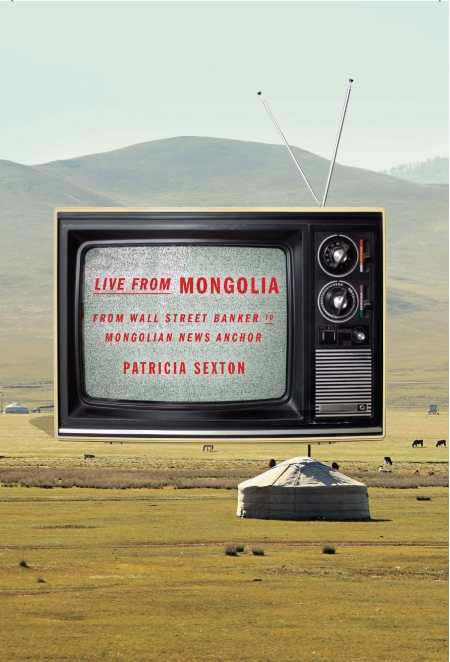Live from Mongolia
From Wall Street Banker to Mongolian News Anchor
Former Wall Street banker invades Mongolia to tell stories of the people, and to rediscover herself anew.
Once a Wall Street banker, Patricia Sexton quit her lucrative but increasingly draining job to intern at a Mongolian television station. “I was going from what I’d been told to want, to what I truly wanted,” she writes as she embarks on the summer journey that inspired this debut. Part travel memoir, part motivational account of becoming a foreign news correspondent, Live from Mongolia reveals Sexton’s hardheaded abandon and inspiration, shows tenuous links to Genghis Khan’s determination and legendary rise, and comments on society’s expectations toward women.
Sexton undertook the seemingly radical career change as a single adult with no dependents, and with a financial net already in place. These facts do not entirely diminish the story; she briefly acknowledges her privileges, most pointedly after her Mongolian host was robbed by thieves who were waiting for her and who had noted the disparity between her and the neighborhood residents. Without dwelling on the contrast between her circumstances and those of the people she meets in the post-Soviet country, Sexton builds a case for pushing against real and imagined limitations. Through recollections of stories she helped gather, including features on individuals who similarly chased their own dreams, a common excitement emerges in stories of people who have found deeper satisfaction in their daily work.
Less tightly focused chapters provide glimpses of collegial nightlife in the English-speaking community. An attempted romantic encounter that never came to fruition highlights the author’s uncertainties on marriageability, yet it remains a tangential topic. Mentions of other women who were similarly departing from the traditional path—including a French executive tracking horses—hint at potential themes of empowerment, but the author wisely refrains from questioning female ambition or from judging those who do opt for family and domesticity. The most engrossing passages in the book turn away from relationship matters and detail the day-to-day lives of Mongolians through culinary forays during the course of Sexton’s work.
Sexton’s candor in portraying setbacks—including the admission that she returned to Wall Street before resuming her course—is one of the more appealing aspects. There is little sense that bravado alone played a role; the optimism that emerges is not born of naivety and becomes all the more credible in its call to embrace risk to reinvent oneself.
Reviewed by
Karen Rigby
Disclosure: This article is not an endorsement, but a review. The publisher of this book provided free copies of the book to have their book reviewed by a professional reviewer. No fee was paid by the publisher for this review. Foreword Reviews only recommends books that we love. Foreword Magazine, Inc. is disclosing this in accordance with the Federal Trade Commission’s 16 CFR, Part 255.

